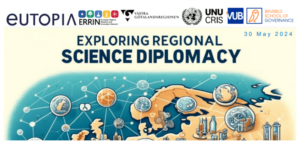EUTOPIA Science Diplomacy Seminar: Explore Regional Science Diplomacy on 30 May


Science diplomacy has traditionally been positioned in the framework of national and supranational endeavors. Consequently, the discourse and investigation into science diplomacy at the subnational regional level remains scant. This oversight is notable considering these actors also play a key role on the international stage, including through leveraging their scientific research and innovation capabilities to bolster their global profiles and contribute to solving global problems.
This science diplomacy seminar will be held in concert with the European Regions Research and Innovation Network (ERRIN), the Unit on Non-Traditional Diplomacy (UNU-CRIS and BSoG), and EUTOPIA associate partner Region Västra Götaland. The event aims to facilitate a rich dialogue among regional representatives and academics to share and explore effective strategies for achieving their science diplomacy objectives. A focal point of discussion will be the intricate interplay between universities and their regional contexts, delving into how this partnership epitomizes the 'triple helix' model of innovation, characterized by the collaborative interdependence of academia, industry, and government.
During this event, we will:
- Explore how regions can utilize their scientific institutions, research centers, and innovation ecosystems to influence global scientific collaboration and diplomacy.
- Examine the contributions of regions to global issues such as climate change, public health, and sustainable development through science diplomacy.
- Investigate the ways in which science diplomacy can spur innovation, attract investment, and promote economic development at regional levels.
- Delve into the models for successful collaboration between academic institutions and regional governments to enhance research capabilities and educational opportunities.
- Identify the unique challenges faced by regions in engaging with science diplomacy, including resource constraints, political dynamics, and coordination with national policies.
Find more information here or register here.